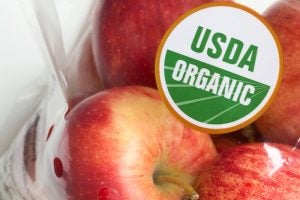You know, the type where someone leans over and whispers it in hushed tones.
I’m sure every industry, company, organization, and group has information only known to those on the inside. There’s not necessarily any written documentation or a citation you can reference, but this news and gossip is passed around and casually referenced in conversations.
Agriculture definitely has insider knowledge. It’s not the fear-mongering stuff people dream it is, though. It’s certainly not whether GMOs are toxic, pesticides are poisoning our water sources, or how farm animals are routinely abused [insert major eye roll here].
Instead, it involves juicier details: someone is running a lucrative but dubiously legal side business, some people are wealthy despite appearing poor, and there’s insider knowledge that “organic” farming often isn’t truly organic.
That last piece of knowledge often drives me batty. I’ve made no secret about the fact that I don’t and can’t support companies that use the USDA’s organic certification to spread disinformation, lie to customers, and make that label about more than it really is.

Organic is a marketing term supported by a set of rules that appeal to the natural fallacy. And if a company will benefit from the fake health halo and premium prices, they better comply perfectly with the National Organic Program’s standards.
Yet those in the industry know that isn’t always the case. Since I started writing publicly about agriculture over a decade ago, I’ve had countless people share these types of stories from the field and international trade all the way to the grocery store. I rarely shared anything because there’s not always a lot of proof — and I pride myself on always relying on well-documented information.
Well, we finally have an example I can write about.
An administrative law judge upheld the California Department of Food and Agriculture’s penalty against Agro Research International LLC. In 2020, CDFA investigated the company’s AGRO GOLD WS product after receiving complaints.
It was labeled and marketed as an organic fertilizer (yes, organic farmers use fertilizers too). However, multiple samples of the organic fertilizer tested positive for synthetic herbicides. CDFA had a problem with that because those herbicides aren’t allowed in organic production. Agro Research claimed the contamination was unintentional.
CDFA wasn’t taking this violation of the USDA’s National Organic Program lightly. It fined Agro Research $1.89 million, finding that the company had mislabeled and adulterated its organic fertilizer. Agro Research must also pay for CDFA’s investigative costs, which are almost $100,000. CDFA Secretary Karen Ross highlighted the case as a demonstration of the agency’s commitment to maintaining the integrity of California’s organic label and ensuring truth in labeling practices.
Ross is right. If you’re going to play the organic game, you must follow the rules. If not, then what was the point? I’m not worried about the integrity of the label because the herbicides found aren’t going to hurt anything (except, well, weeds). But it better be right when these companies want to upcharge the end products to consumers.
I’m willing to bet that if there were more investigations, we would discover many more examples like this. Now, before you lose it, the vast majority of organic-certified farms play by the rules. So do the companies that produce inputs, which are resources to support producing the final products for these farms (yes, organic farms use inputs, too).
Undoubtedly, some players exploit the organic certification for financial gain. Ask any honest farmer; they’ve heard the stories and know the tricks. This is the insider information known within the industry.
Amanda Zaluckyj blogs under the name The Farmer’s Daughter USA. Her goal is to promote farmers and tackle the misinformation swirling around the U.S. food industry.

